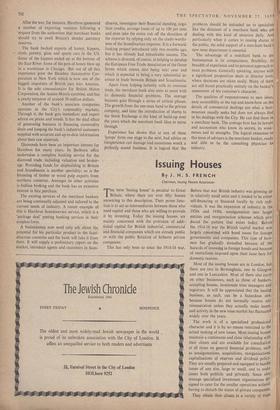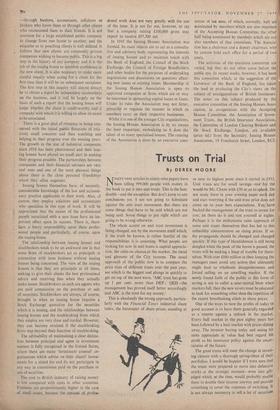Issuing Houses
By J. H. S. FRENCH
Chairman, Issuing Houses Association•
rrHE term 'issuing house' is peculiar to Great I Britain, where there are over fifty houses answering to this description. Their prime func- tion is to act as intermediaries between those who need capital and those who are willing to provide it by investing. Today the issuing houses are mainly concerned with the provision of addi- tional capital for British industrial, commercial and financial companies which are already public or with the public flotation of hitherto private companies.
This has only been so since the 1914-18 war. Before that war British industry was growing up in relatively small units and it tended to be either self-financing or financed locally by rich indi- viduals. It was the expansion of industry in the 1920s and 1930s, amalgamation into larger entities and reorganisation schemes which pro- duced the pattern that exists today. Before the 1914-18 war the British capital market was largely concerned with bond issues for foreign governments and companies. This type of busi- ness has gradually dwindled because of the hazards of investing in foreign bonds and because of restrictions imposed upon their issue here for domestic reasons.
Most of the issuing houses are in London, but there are two in Birmingham, one in Glasgow and one in Lancashire. Most of them also 'carry on other businesses, such as • those of bankers. accepting houses, investment trust managers and registrars. It will be appreciated that the issuing business, as such, can be a hazardous one, because houses do not normally receive any remuneration unless they actually make issues, and activity in the new issue market has fluctuated widely over the years.
The work is of a specialised professional character and it is by no means restricted to the actual making of new issues. Most issuing houses maintain a continuous and close relationship with their clients and are available for consultation at all times on general financial problems, such as amalgamations, acquisitions, reorganisations, capitalisations of reserves and dividend policy. They are usually prepared and equipped to handle issues of any size, large or small, and to make issues both publicly and privately. Some also manage specialised investment organisations de- signed to cater for the smaller operations without having to disturb the status of private companies.
They obtain their clients in a variety of waYs —through bankers, accountants, solicitors or brokers who know them or through other clients who recommend them to their friends. It is not common for a large established public company to change from one house to another, and the etiquette as to poaching clients is well defined, It follows that new clients arc commonly private companies wishing to become public. This is a big step in the history of any company and it is the job of the issuing house to establish confidence in the new client. It is also necessary to make more careful inquiry when acting for a client for the first time than it will be on subsequent occasions. The first step in this inquiry will almost always be to obtain a report by independent accountants on the business, and it will be largely on the basis of such a report that the issuing house will judge whether the client is credit-worthy, and a company with which it is willing to allow its name to be associated.
There is a great deal of romance in being con- cerned with the initial public flotations of rela- tively small concerns and then watching and helping in their progress over the ensuing years. The growth in the size of industrial companies since 1918 has been phenomenal and their issu- ing houses have played no small part in making their progress possible. The partnerships between companies and their financial advisers are very real ones and one of the most pleasant things about them is the close personal friendships which they often engender.
Issuing houses themselves have, of necessity. considerable knowledge of the law and account- ancy practice applicable to their work. Also, of course, they employ solicitors and accountants who specialise in this type of work. It will be appreciated that the names of the professional people associated with a new issue have an im- portant effect upon its success. There is, there- fore, a heavy responsibility upon these profes- sional people and particularly, of course, upon the issuing house.
The relationship between issuing houses and stockbrokers tends to be an awkward one in that some firms of stockbrokers act as principals in connection with issue business without issuing houses being concerned. The view of the issuing houses is that they are principals at all times, seeking to give their clients the best professional advice and receiving fees when they actually make issues. Stockbrokers as such are agents who are paid commission on the purchase or sale of securities. Stockbrokers are always, of course, brought in when an issuing house requires a Stock Exchange quotation for the securities which it is issuing, and the relationships between issuing houses and the stockbroking firms which they employ are very close and cordial. However, they can become strained if the stockbroking. firms step beyond their function of stockbroking.
The advisability of maintaining a clear distinc- tion between principal and agent in investment matters is fully recognised in the United States, where there are many 'investment counsel' or- ganisations which advise on their clients' invest- ments for a stated fee and do not participate in any way in commission paid on the purchase or sale of securities.
The cost to British industry of raising money is low compared with costs in other countries. Expenses are proportionately higher in the case of small issues, because the amount of profes- sional work does not vary greatly with the size of the issue. It is not far out, however, to say that a company raising £100,000 gross may expect to receive £97,500 net.
In 1945 the Issuing Houses Association was formed. Its main objects are to act as a consulta- tive and advisory body representing the interests of issuing houses and to maintain touch with the Bank of England, the Council of the Stock Exchange, the Council of Foreign Bondholders and other bodies for the purposes of undertaking negotiations and discussions on questions affect- ing new issues or existing issues. Membership of the Issuing Houses Association is open to approved companies or firms which are or may be interested in sponsoring capital issues or loans. Under its rules the Association may not fetter, prescribe or regulate the manner in which its members carry on their respective businesses.
Whilst it is one of the younger City organisations, the Issuing Houses Association is by. no means the least important, embodying as it does the talent of so many specialised houses. The running of the Association is done by an executive corn- mittee of ten men, of which, normally, half are nominated by members 'which are also members of the Accepting Houses Committee, the other half being nominated by members which are not also members of that commiteee. The Associa- tion has a chairman and a deputy chairman, who by custom hold each office for a period of two years, The activities of the executive committee are varied, but they do not often come before the public eye. In recent weeks, however, it has been this committee which, at the suggestion of the Governor of the Bank of England, has taken the lead in producing the City's views on the subject of amalgamations of British businesses.1 The notes on this subject produced by the executive committee of the Issuing Houses Asso- ciation, in co-operation with the Accepting Houses Committee, the Association of Invest- ment Trusts, the British Insurance Association, the Committee of London Clearing Bankers and the Stock Exchange, London, are available (price 6d.) from the Secretary, Issuing Houses Association, 19 Fenchurch Street, London, EC3.



























































 Previous page
Previous page